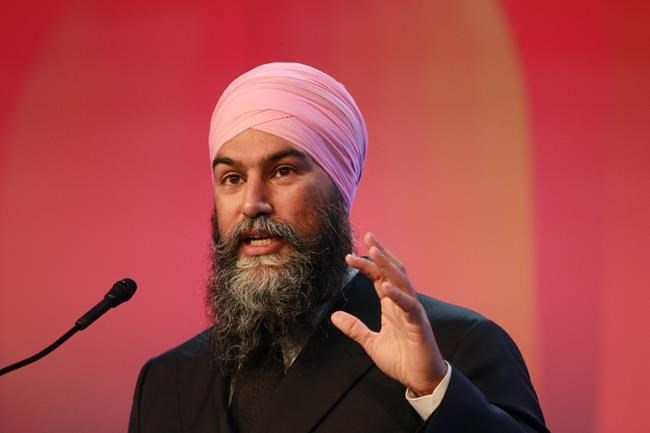OTTAWA — Canadians can and must do better as hate crimes increase during the Israel-Hamas war, federal New Democrat Leader Jagmeet Singh says, calling back to his own experiences of being targeted for his identity.
There has to be space for people to express their fears, worries and political opinions without provoking hateful conduct, Singh said in a year-end interview with The Canadian Press.
"I think we can be better as a country," the NDP leader said in a phone call from Toronto.
"We need to come to a place of respect for each other, a place where we can be who we are, and we can be celebrated for our identity and not be afraid."
Singh said he recently spoke to Jewish and Muslim Canadians who have expressed concerns about their safety amid an uptick in hate-motivated violence and are worried about wearing religious symbols that are part of their identity.
"They're afraid (for their kids) to wear anything that identifies them as Jewish. They're nervous to wear their yamaka or Star of David. These symbols are part of their identity, and they're afraid of that," he said.
He added that he heard from members of the Muslim community that "it's a reminder of post-9/11," a time of significant "suspicion and negativity."
Again in the current climate, he said, "if a woman wears a hijab she's even more nervous to be in public."
It's a familiar concern for Singh, who wears a turban — a symbol of his Sikh faith.
"I grew up being picked on, having my turban ripped off my head and having to fight back," Singh said.
"I remember what that's like, being afraid to be yourself and the courage it takes to still do it."
The heightened fear comes after Hamas militants killed an estimated 1,200 people in Israel on Oct. 7 and took about 240 more hostage, provoking an Israeli military response that local authorities said has killed almost 22,000 people in the Gaza Strip.
In Canada, protesters have been clashing on streets and on university campuses. And police are reporting significant spikes in hate crimes.
"That is a real scary thing, and it's happening in a real shocking way. I'm seeing a massive rise," Singh said.
Last month, Toronto police said reports of hate crimes increased by more than 104 per cent between Oct. 7 and Dec. 17 compared to the same time period last year. That included 56 antisemitic hate crimes, and 20 anti-Muslim, anti-Palestinian or anti-Arab hate crimes.
Police also said they were investigating an exchange between a demonstrator and another person during a pro-Palestine protest at a downtown mall.
Toronto is not an outlier.
In Montreal, Jewish schools have been shot at, a Molotov cocktail was thrown at a building belonging to the Jewish Community Council of Montreal and anti-Muslim graffiti was spray-painted near an Islamic centre.
In November, Calgary police said they charged a man who allegedly used antisemitic language at a protest. His charges were later stayed.
And last month, RCMP announced that it arrested and charged a teen in Ottawa with terrorism-related offences that allegedly targeted Jewish people. Police warned of a troubling trend in violent extremism among Canadian youth.
In the face of all this, Singh said he believes Canadians can do better when it comes to making each other feel safe.
"We need to come to a place of respect for each other, a place where we can be who we are," he said.
"And we can be celebrated for our identity and not be afraid."
This report by The Canadian Press was first published Jan. 2, 2024.
Mickey Djuric, The Canadian Press


